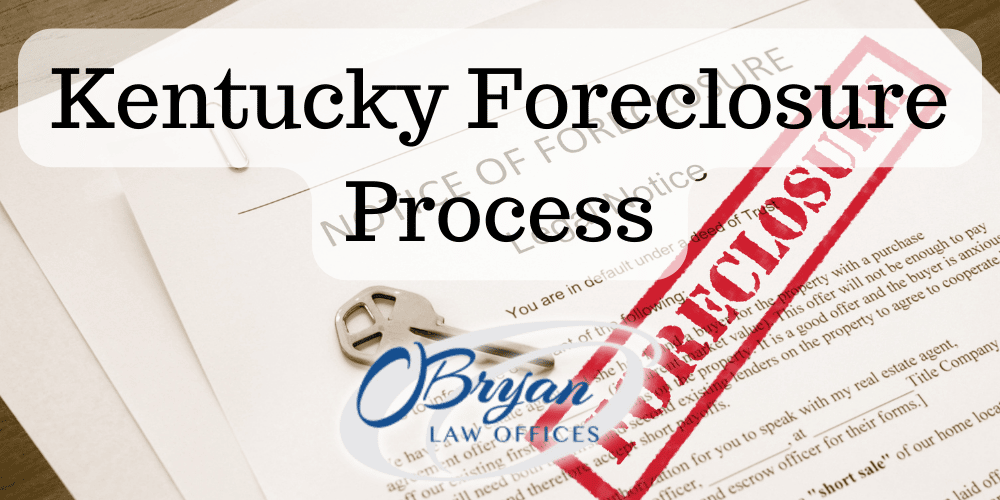Foreclosure is something that no homeowner wants to face in their lifetime. However, financial situations can change in the blink of an eye. Maybe you were in a major accident and you have mountains of medical debt that you didn’t before. New expenses and payments can greatly hinder your ability to pay your bills on time. If you get too far behind on mortgage payments, however, you may find yourself facing foreclosure. In this blog, the Kentucky bankruptcy lawyers at O’Bryan Law Offices will help you understand the Kentucky foreclosure process and save your home in the process.
Although filing bankruptcy might seem like the worst decision to make when you’re already facing foreclosure, it can actually help you in a lot of ways. The automatic stay of bankruptcy allows many debtors to save their homes, reorganize their finances, and obtain a fresh financial start. If you’re looking for a way out, look no further than O’Bryan Law Offices. Our foreclosure defense lawyers are here to help you explore your options. To schedule a free consultation with us, please call our office at 502-339-0222 today.
How Do Foreclosures Occur in Kentucky?
Kentucky homeowners may find themselves facing foreclosure for a few different reasons. The most common reasons include the following.
- Missing mortgage payments
- Missing second mortgage payments
- Failing to pay home equity loans
- Failing to pay property taxes
Keep in mind that missing one payment doesn’t automatically mean that your home will undergo a foreclosure sale. Foreclosure laws in Kentucky require adherence to a certain process, which is overseen by the courts. If you are facing foreclosure in Kentucky, we strongly recommend working with an attorney. This way, you can give yourself the best possible chance at saving your home.
What Happens if You Miss a Mortgage Payment?
Missing one mortgage payment often does not lead to foreclosure. Once a homeowner misses a payment, they have defaulted. A default is simply another term for a missed payment. Once you default, your servicer must send you a notice of default. This is usually done once your payment is overdue by at least 30 days. This is the beginning of the pre-foreclosure process.
What to Know About the Foreclosure Process in Kentucky

When is it too late to stop foreclosure? Prior to the foreclosure crisis in 2010, borrowers didn’t have much in the way of protection against foreclosure. In fact, many state and federal laws actually favored mortgage servicers instead of homeowners. However, state and federal mortgage servicing laws have since been updated to provide more protections for borrowers.
Generally, loan servicers must provide borrowers with loss mitigation opportunities. They must also strictly adhere to state and federal foreclosure laws. So, if you’re behind on your mortgage payments in Kentucky, you still have options. Understanding the full Kentucky foreclosure process is crucial if you want to save your home and regain control of your finances.
Pre-Foreclosure in Kentucky
The pre foreclosure process officially begins when you fall behind on your mortgage payments. Your mortgage company or servicer can charge certain fees during this time. Examples of these fees include late fees and inspection costs. They must also send you information about how to avoid foreclosure, as well as a breach letter.
Once you miss a payment, most lenders give borrowers a grace period of around ten to fifteen days. When this grace period passes, you will begin to see late fees. You can find out what your grace period and late fees are by looking at your promissory note. This information will also be on your mortgage statement each month.
Breach Letter
A breach letter is basically a notice from the lender that informs borrowers that they are in default. Your mortgage contract mostly likely has this provision as a requirement. Before a lender can proceed and accelerate the loan, they must give you a chance to fix the default and avoid foreclosure altogether.
When Does Foreclosure Begin?
Federal and state laws require that you be in default for at least 120 days before the servicer officially begins the judicial foreclosure process against you. This gives borrowers ample time to submit a loss mitigation application. There are only a few exceptions to this rule.
Kentucky is a judicial foreclosure state, meaning the foreclosure process is handled by the courts. First, the servicer will notify you that they intend to file a foreclosure lawsuit against you. You will then have around 20 days to respond to the notice. If you fail to respond, the servicer can request a default judgment from the court, which allows them to proceed with the foreclosure sale.
However, you can also defend against the foreclosure sale. This begins the process of litigation. We highly recommend that you find a foreclosure attorney with considerable experience in court. Having a skilled litigator will help ensure that the process proceeds as smoothly as possible for you. They will also be well-acquainted with different methods of foreclosure defense.
The Foreclosure Sale
If the process proceeds to the foreclosure sale, a few things can happen. Under Kentucky law, the mortgage company or servicer will usually make what is called a credit bid. This means that they make a bid on the house for the amount that is owed on it. They could also bid less than this amount. However, the lender can also secure a deficiency judgment if they are the highest bidder, but they bid less than what you owe.
A deficiency judgment means that you will then pay the difference to the lender. However, if the foreclosure sale results in excess profits, this excess will go to you. Find foreclosure lawyers in your area to work with you on your case. This will ensure that all state and local requirements are met and followed.
Moving Out After Foreclosure
Once the foreclosure sale concludes, the new owner must give you ten days’ notice before they have the right to possess the property. Once this ten-day period passes, they must seek a Writ of Possession from the court. Only then can they formally possess the home.
Redemption Period in Kentucky
Kentucky law has what is known as the redemption period. A redemption period allows foreclosed borrowers a certain amount of time after the foreclosure sale during which they can buy their home back. Kentucky allows a redemption period of six months if the property sells for under two-thirds of its appraised value.
Kentucky Foreclosure Laws
Throughout the process of foreclosure, it is vitally important to work with a skilled foreclosure attorney. It can be difficult to navigate court processes on your own, but working closely with an attorney will help things move more smoothly. Kentucky’s state foreclosure laws require that all foreclosures must be judicial. This means that the final summary judgment on the foreclosure must be handed down by a circuit court.
Deficiency Judgments
We mentioned deficiency judgments in a previous section, but now we’ll go into more detail. A deficiency judgment occurs if the foreclosed home sells for less than the borrower owes on it. As an example, let’s say that you owe $450,000 on the home, but it only sells for $350,000 as the foreclosure sale price. You have a deficiency of $100,000.
One common question we often hear is, “If my house is foreclosed do I still owe the bank?” Kentucky law allows lenders to pursue a personal judgment against the debtor in order to recover the deficiency. In most Kentucky cases, the lender will receive a deficiency summary judgment. They could then collect the $100,000 from you.
How Long Does the Foreclosure Process Take in Kentucky?
Going up against a mortgage company that is seeking a foreclosure judgment against you is very stressful. Facing the stress of financial hardship is already a prominent stressor, so how long will the foreclosure process last in Kentucky? While every case is unique and should be handled as such, a typical foreclosure should begin and end within 5 months on average. However, this process can lengthen or shorten, largely depending on the actions of the borrower.
How Can I Stop Foreclosure in Kentucky?
Thankfully, borrowers have a few options for avoiding a foreclosure complaint (and subsequent foreclosure auction). Three options are the most popular – filing for bankruptcy, reinstating the mortgage loan, and loss mitigation. We outline each option below.
Reinstate the Mortgage Loan
Kentuckians don’t automatically have the right to reinstate their loan before the foreclosure sale. However, if it was a high-cost home loan, they do have a statutory right to reinstate the loan. For these loans, lenders are required to give the borrower at least 30 days to reinstate the loan. However, certain mortgages (such as a federally backed mortgage loan) automatically include provisions for reinstatement.
File for Bankruptcy
Filing for bankruptcy is a valid and useful option for both avoiding foreclosure and regaining control of your finances. This is especially true if you’re in a bind, or if you’re only days away from the sale of your home. As soon as you file for bankruptcy, you receive the protection of the automatic stay. The stay prevents the lender from foreclosing or collecting on your debts. Filing for Chapter 7 can help you delay the process, while Chapter 13 can help you save your home, but only if you can afford to pay back your debts. To learn more about how bankruptcy can help homeowners facing foreclosure, contact the Kentucky bankruptcy attorneys at O’Bryan Law Offices.
Loss Mitigation Options
Another viable solution is to try to negotiate loss mitigation with your mortgage lender. Ideally, you could call them as soon as you realize you might have trouble paying your mortgage. In fact, the sooner you call, the more time you give yourself to find a solution with the lender. We recommend asking for your lender’s loss mitigation department. They will walk you through the process of pursuing loss mitigation options, such as loan modification.
Contact a Kentucky Foreclosure Defense Lawyer
At O’Bryan Law Offices, we’re highly passionate and skillfully successful when it comes to helping Kentucky and Indiana residents file bankruptcy. We understand that most people hear bankruptcy and imagine it as something they never want to resort to. However, our experienced attorneys know that it is simply a legal option for debtors to discharge their debts. Chapter 7 and Chapter 13 filings can and often do help those who are drowning in debt a helping hand.
Rather than working with a Kentucky debt consolidation company or pursuing a loan modification, consider bankruptcy. It guarantees you one thing that the other options cannot – legal protection. As soon as you file bankruptcy, you receive the protection of the automatic stay, and your creditors must cooperate with the bankruptcy court. If you’re reaching for a way out, consider bankruptcy. To schedule a free consultation with a Louisville bankruptcy attorney, call 502-339-0222 today.







